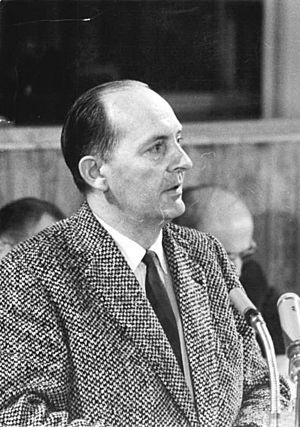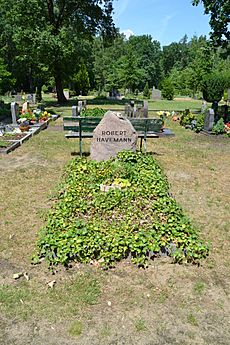Robert Havemann facts for kids
Quick facts for kids
Robert Havemann
|
|
|---|---|

Havemann in 1960
|
|
| Born | 11 March 1910 Munich, Kingdom of Bavaria, German Empire
|
| Died | 9 April 1982 (aged 72) Grünheide, East Germany
|
| Alma mater | Kaiser Wilhelm Institute |
| Spouse(s) | 1: Antje Hasenclever 1934 2. Karin von Trotha 1949 3: Annedore Grafe 1974 |
| Scientific career | |
| Fields | Chemistry |
Robert Havemann (German: [ˈʁoːbɛʁt ˈhaːvəˌman]; 11 March 1910 – 9 April 1982) was a German chemist. He was also known as a dissident in East Germany. A dissident is someone who speaks out against their government.
Contents
Robert Havemann's Life and Work
Early Life and Education
Robert Havemann was born in Munich in 1910. He studied chemistry in Berlin and Munich. This was between 1929 and 1933. Later, he earned a special degree called a doctorate. He got it in physical chemistry from the Kaiser Wilhelm Institute.
Fighting for Freedom
In 1932, Havemann joined the Communist Party of Germany. He also helped start a group called the European Union. This group worked against the government at the time. In 1943, the Gestapo arrested him. The Gestapo was the secret police.
He was sentenced to death. But his execution was delayed many times. This was because his old co-workers said he was important. They said his work on chemical weapons was very valuable. They also said he was needed to explain his research. These delays helped him survive. He was still alive when his prison was freed by the Red Army.
After World War II
After the war, Robert Havemann became a leader. He was in charge of administration at the Kaiser Wilhelm Institute. This was in Berlin. But in 1948, he lost this job. This happened because of political pressure from American authorities. He kept working as a scientist at the institute. However, he was stopped from using his lab in 1950.
He then became a professor. He taught physical chemistry at the Humboldt University of Berlin. In 1950, he became a member of the Volkskammer. This was the parliament of East Germany. He also won a national prize in 1959.
Speaking Out and Challenges
In 1963, Havemann gave some lectures. He talked about science and philosophy. He also gave an interview to a West German newspaper. Because of this, he was removed from the ruling political party. This party was called the Socialist Unity Party of Germany. He was also fired from the university.
His son, Florian Havemann, moved to West Germany in 1971.
Robert Havemann continued to speak his mind. He was a socialist critic. In 1976, he was put under house arrest. This meant he had to stay at his home in Grünheide. He remained under house arrest until he passed away in 1982. He had been sick with a lung disease for a long time.
Recognition and Legacy
In 1989, the Socialist Unity Party of Germany officially recognized him. They said he was treated unfairly before. In 2005, Havemann received a special honor. He was given the title Righteous among the Nations. This award is from Yad Vashem, a Holocaust memorial in Israel. It honors non-Jewish people who helped save Jews during the Holocaust.
See also
 In Spanish: Robert Havemann para niños
In Spanish: Robert Havemann para niños


